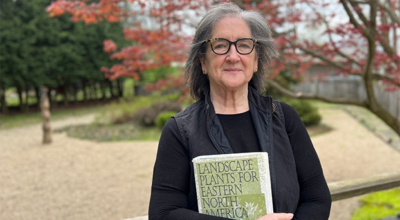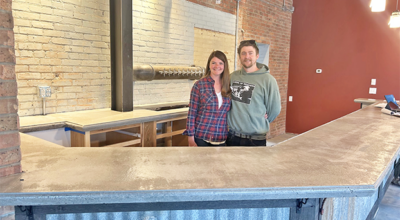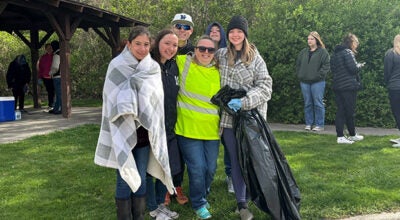Ross home from Dominican school
Published 10:43 pm Thursday, May 6, 2010

Program chair Barbara Groner welcomed Sarah Ross to Rotary Thursday. The 1992 Dowagiac graduate founded a school in the Dominican Republic last November and is holding a picture of her students. Their stocking caps were hand-knit by a Michigan woman. (The Daily News/John Eby)
By JOHN EBY
Dowagiac Daily News
Since we last spoke with Sarah Ross Jan. 8, an earthquake devastated Haiti – the other end of her island.
Two refugees, ages 8 and 10, now attend the preschool for ages 3 to 6 she founded Nov. 15, 2009.
Only the occasional “rain day” cancels year-around classes like a Michigan snow day.
Ross is looking forward to a busy summer.
She recently was in New York and will be in Miami meeting with a benefactor, back home in Dowagiac in July and traveling to Austria, her boyfriend’s home country.
Her 18 students include eight Dominicans, seven Haitians, a German, an Italian/Dominican and a Peruvian/East Indian. The latter three foreigners pay $100 a month tuition.
Ross, a 1992 Union High School graduate, founded and is lead teacher of 3 Mariposas Montessori on the Dominican Republic’s north shore.
“When people ask me where I’m from, I don’t say ‘two hours outside Chicago,’ I say, ‘Dowagiac, Mich.,’ because people actually do know where Dowagiac is,” she said.
The name in Spanish means “three butterflies,” which encompasses training students, parents and teachers (maestros).
“Butterflies symbolize hope,” she told Dowagiac Rotary Club Thursday noon at Elks Lodge 889.
“Parents” are whoever brings the child to school each day, including grandparents, aunts and uncles, siblings, even motorcycle drivers.
Ross prefers home school to Dominican public schools. “If I was poor and couldn’t afford to send my child to private school,” she said, “I’d do home education. Public education takes them backward. The Haitian refugees are learning to speak English because I speak English with the kids” and they learn Spanish from Ariana and volunteers.
Classes take place Monday through Friday from 8:15 to 11:30 a.m.
Afternoons, Ross focuses on parents and teachers at the school in her former house.
“You snooze, you lose” is a motto because “in the Dominican Republic it’s very common to show up a half hour or hour late and breaks all of our concentration,” so “hasta manana” (until tomorrow) greets tardiness.
“It happens once and then it never happens again,” she said.
With slides she showed how children remove their shoes upon arrival, wash their hands, take a vitamin, take their own attendance and read.
“They love books,” she said. “They don’t have books in their homes.”
There is a “peace table” where students can hash out disputes. “There’s a lot of racism in the Dominican Republican,” she said.
From a box of peace stones, each child removes one, thinks of something that makes them feel serene and happy, share their thoughts and pass it along, “looking into the person’s eyes and addressing them properly.”
Illustrating discipline, Ross shows her students attending a birthday party at a “fancy” multi-million-dollar home on the ocean with a pool where only three guests were not from the school.
“I just said, ‘Let’s do the chugga-chugga choo-choo with our arms at our sides and just look at all the beautiful things.’ They were drooling at the pool,” Ross said.
“In the morning they pick up leaves from in front of the school and water the plants. Throughout the morning they can weed and water the garden in back and harvest vegetables. We also compost out there. They do a lot of things on their own to learn independence,” such as making orange juice for snack time.
Others learn to button, tie and work zippers with guides Sarah and her parents made.
“This little guy is learning coordination and concentration by emptying beads. We teach them to be confident. They wash their own dishes.”
With donated books, “Children are allowed to take one book home whenever they want with no due date,” she explained. “When they’re finished, they can check out another one.” Older youngsters in the community are given checkout privileges as well.
Ross said some people with limited knowledge of Montessori equate it with students doing whatever they want, but while they have a lot of freedom, it’s within limits. “There are boundaries because I control them.”
Multi-age classrooms keep all ages together, so younger pupils learn from observation as well as teaching.
Some students prefer to stay on task by themselves, but for those who prefer socializing while they work, that is allowed.
Ross said the school’s recycling program could fill a second program, such as building an extension with plastic bottles filled to become bricks.
A play set was assembled during Christmas break by a Florida woman Sarah didn’t know.
Children were led outside with great anticipation, but they stood there silently, baffled.
“What is it?” said the look on their faces.
“They don’t have parks down there,” said Ross, who had to nudge them to climb on it.
A friend gives yoga classes as part of the health curriculum. Musicians and artists are invited to the school. An artist made pinatas with the children.
How does she determine which 20 children can attend? A Rotarian asks Ross.
“Instantly, you want to help everyone,” she allowed, “but everyone’s poor. Everyone’s needy, so I’m going to take the motivated ones,” such as parents she observes taking children to clinics for health checkups.
Three volunteers run her twice-weekly afternoon English classes for parents and siblings.
They are from England, the United States and Canada.
When she conducted a home visit with Ariana, her teacher, the mother of two students offered her “coconut water” from the tree in her yard.
“Health and hygiene are very important,” Ross said. “It’s so common to not have 20 kids because of some fungus or cough. I do home visits to try to bring in what we do at school so parents can do the same thing,” such as peace necklaces.
With four volunteers coming in January, a couple may be asked to read with children at home. Her volunteer Kirby, down for six months, is a Springsteen cousin. He lives next to the school in an apartment. Franchesca and Gladys are teen-aged siblings of students.
While Americans are known for their volunteerism, Dominicans are not, but Ross said at least at her school “they’re sprouting out left and right. I live in a touristy community with Serbians and Germans. From all over the place. My sister’s (Katie Silvernale) church group is coming down with 25 people, sleeping on the school floor and beautifying parents’ homes.”
Sponsorships for a child costs $100 a month; $50 a month for a teacher; and $25 a month for a parent, plus materials and money can be donated (“every penny helps,” states the school’s brochure.
Early on, the youngest of Harvey and Janet Ross’s three children felt pulled by adventure and craved commingled cultures, though she belatedly learned Spanish after French.
“I’m so passionate about what I do I think that I always knew the capability was there,” Ross said, “but until I found myself between a rock and a hard place, that’s when I finally made the decision to do this. I was happy at the non-profit (where she worked five years after teaching at a school in Grand Rapids which City Clerk Jim Snow’s grandkids attend).
“I never thought I’d be opening something on my own like this. This is definitely a risk, but I am happy as can be. I love, love, love so much what I do, working with the kids and seeing their progress.”






